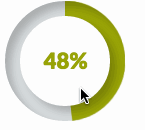CSS Progress Circle [fermé]
j'ai cherché sur ce site pour trouver des barres de progression, mais celles que j'ai pu trouver montrent des cercles animés qui vont à 100%.
je voudrais qu'il s'arrête à certains pourcentages comme dans la capture d'écran ci-dessous. Est-ce que je peux faire ça en utilisant seulement CSS?
progress bars" src="/images/content/14222138/c8349063be58ca3293a4ef3a5e00881f.png">
4 réponses
j'ai créé un tutoriel sur la façon de faire exactement cela avec CSS3 et la bibliothèque moins JavaScript. Vous pouvez trouver le blogpost ici: https://medium.com/secoya-tech/a917b80c43f9
voici un jsFiddle du résultat final. Le pourcentage est défini par l'attribut data-progress . Les changements sont animés par des transitions CSS.

j'ai créé un violon en utilisant seulement css .
.wrapper {
width: 100px; /* Set the size of the progress bar */
height: 100px;
position: absolute; /* Enable clipping */
clip: rect(0px, 100px, 100px, 50px); /* Hide half of the progress bar */
}
/* Set the sizes of the elements that make up the progress bar */
.circle {
width: 80px;
height: 80px;
border: 10px solid green;
border-radius: 50px;
position: absolute;
clip: rect(0px, 50px, 100px, 0px);
}
/* Using the data attributes for the animation selectors. */
/* Base settings for all animated elements */
div[data-anim~=base] {
-webkit-animation-iteration-count: 1; /* Only run once */
-webkit-animation-fill-mode: forwards; /* Hold the last keyframe */
-webkit-animation-timing-function:linear; /* Linear animation */
}
.wrapper[data-anim~=wrapper] {
-webkit-animation-duration: 0.01s; /* Complete keyframes asap */
-webkit-animation-delay: 3s; /* Wait half of the animation */
-webkit-animation-name: close-wrapper; /* Keyframes name */
}
.circle[data-anim~=left] {
-webkit-animation-duration: 6s; /* Full animation time */
-webkit-animation-name: left-spin;
}
.circle[data-anim~=right] {
-webkit-animation-duration: 3s; /* Half animation time */
-webkit-animation-name: right-spin;
}
/* Rotate the right side of the progress bar from 0 to 180 degrees */
@-webkit-keyframes right-spin {
from {
-webkit-transform: rotate(0deg);
}
to {
-webkit-transform: rotate(180deg);
}
}
/* Rotate the left side of the progress bar from 0 to 360 degrees */
@-webkit-keyframes left-spin {
from {
-webkit-transform: rotate(0deg);
}
to {
-webkit-transform: rotate(360deg);
}
}
/* Set the wrapper clip to auto, effectively removing the clip */
@-webkit-keyframes close-wrapper {
to {
clip: rect(auto, auto, auto, auto);
}
}<div class="wrapper" data-anim="base wrapper">
<div class="circle" data-anim="base left"></div>
<div class="circle" data-anim="base right"></div>
</div> aussi cochez cette case violon ici (css seulement)
@import url(http://fonts.googleapis.com/css?family=Josefin+Sans:100,300,400);
.arc1 {
width: 160px;
height: 160px;
background: #00a0db;
-webkit-transform-origin: -31% 61%;
margin-left: -30px;
margin-top: 20px;
-webkit-transform: translate(-54px,50px);
-moz-transform: translate(-54px,50px);
-o-transform: translate(-54px,50px);
}
.arc2 {
width: 160px;
height: 160px;
background: #00a0db;
-webkit-transform: skew(45deg,0deg);
-moz-transform: skew(45deg,0deg);
-o-transform: skew(45deg,0deg);
margin-left: -180px;
margin-top: -90px;
position: absolute;
-webkit-transition: all .5s linear;
-moz-transition: all .5s linear;
-o-transition: all .5s linear;
}
.arc-container:hover .arc2 {
margin-left: -50px;
-webkit-transform: skew(-20deg,0deg);
-moz-transform: skew(-20deg,0deg);
-o-transform: skew(-20deg,0deg);
}
.arc-wrapper {
width: 150px;
height: 150px;
border-radius:150px;
background: #424242;
overflow:hidden;
left: 50px;
top: 50px;
position: absolute;
}
.arc-hider {
width: 150px;
height: 150px;
border-radius: 150px;
border: 50px solid #e9e9e9;
position:absolute;
z-index:5;
box-shadow:inset 0px 0px 20px rgba(0,0,0,0.7);
}
.arc-inset {
font-family: "Josefin Sans";
font-weight: 100;
position: absolute;
font-size: 413px;
margin-top: -64px;
z-index: 5;
left: 30px;
line-height: 327px;
height: 280px;
-webkit-mask-image: -webkit-linear-gradient(top, rgba(0,0,0,1), rgba(0,0,0,0.2));
}
.arc-lowerInset {
font-family: "Josefin Sans";
font-weight: 100;
position: absolute;
font-size: 413px;
margin-top: -64px;
z-index: 5;
left: 30px;
line-height: 327px;
height: 280px;
color: white;
-webkit-mask-image: -webkit-linear-gradient(top, rgba(0,0,0,0.2), rgba(0,0,0,1));
}
.arc-overlay {
width: 100px;
height: 100px;
background-image: linear-gradient(bottom, rgb(217,217,217) 10%, rgb(245,245,245) 90%, rgb(253,253,253) 100%);
background-image: -o-linear-gradient(bottom, rgb(217,217,217) 10%, rgb(245,245,245) 90%, rgb(253,253,253) 100%);
background-image: -moz-linear-gradient(bottom, rgb(217,217,217) 10%, rgb(245,245,245) 90%, rgb(253,253,253) 100%);
background-image: -webkit-linear-gradient(bottom, rgb(217,217,217) 10%, rgb(245,245,245) 90%, rgb(253,253,253) 100%);
padding-left: 32px;
box-sizing: border-box;
-moz-box-sizing: border-box;
line-height: 100px;
font-family: sans-serif;
font-weight: 400;
text-shadow: 0 1px 0 #fff;
font-size: 22px;
border-radius: 100px;
position: absolute;
z-index: 5;
top: 75px;
left: 75px;
box-shadow:0px 0px 20px rgba(0,0,0,0.7);
}
.arc-container {
position: relative;
background: #e9e9e9;
height: 250px;
width: 250px;
}<div class="arc-container">
<div class="arc-hider"></div>
<div class="arc-inset">
o
</div>
<div class="arc-lowerInset">
o
</div>
<div class="arc-overlay">
35%
</div>
<div class="arc-wrapper">
<div class="arc2"></div>
<div class="arc1"></div>
</div>
</div>Ou cette belle "1519210920 rond" barre de progression avec HTML5, CSS3 et JavaScript.
Qu'en est-il?
HTML
<div class="chart" id="graph" data-percent="88"></div>
Javascript
var el = document.getElementById('graph'); // get canvas
var options = {
percent: el.getAttribute('data-percent') || 25,
size: el.getAttribute('data-size') || 220,
lineWidth: el.getAttribute('data-line') || 15,
rotate: el.getAttribute('data-rotate') || 0
}
var canvas = document.createElement('canvas');
var span = document.createElement('span');
span.textContent = options.percent + '%';
if (typeof(G_vmlCanvasManager) !== 'undefined') {
G_vmlCanvasManager.initElement(canvas);
}
var ctx = canvas.getContext('2d');
canvas.width = canvas.height = options.size;
el.appendChild(span);
el.appendChild(canvas);
ctx.translate(options.size / 2, options.size / 2); // change center
ctx.rotate((-1 / 2 + options.rotate / 180) * Math.PI); // rotate -90 deg
//imd = ctx.getImageData(0, 0, 240, 240);
var radius = (options.size - options.lineWidth) / 2;
var drawCircle = function(color, lineWidth, percent) {
percent = Math.min(Math.max(0, percent || 1), 1);
ctx.beginPath();
ctx.arc(0, 0, radius, 0, Math.PI * 2 * percent, false);
ctx.strokeStyle = color;
ctx.lineCap = 'round'; // butt, round or square
ctx.lineWidth = lineWidth
ctx.stroke();
};
drawCircle('#efefef', options.lineWidth, 100 / 100);
drawCircle('#555555', options.lineWidth, options.percent / 100);
et CSS
div {
position:relative;
margin:80px;
width:220px; height:220px;
}
canvas {
display: block;
position:absolute;
top:0;
left:0;
}
span {
color:#555;
display:block;
line-height:220px;
text-align:center;
width:220px;
font-family:sans-serif;
font-size:40px;
font-weight:100;
margin-left:5px;
}
http://jsfiddle.net/Aapn8/3410 /
le code de base est tiré du simple diagramme circulaire http://rendro.github.io/easy-pie-chart /
une autre solution pure à base de css qui est basée sur deux éléments arrondis que je tourne pour obtenir à l'angle droit:
http://jsfiddle.net/maayan/byT76 /
C'est le css de base qui lui permet:
.clip1 {
position:absolute;
top:0;left:0;
width:200px;
height:200px;
clip:rect(0px,200px,200px,100px);
}
.slice1 {
position:absolute;
width:200px;
height:200px;
clip:rect(0px,100px,200px,0px);
-moz-border-radius:100px;
-webkit-border-radius:100px;
border-radius:100px;
background-color:#f7e5e1;
border-color:#f7e5e1;
-moz-transform:rotate(0);
-webkit-transform:rotate(0);
-o-transform:rotate(0);
transform:rotate(0);
}
.clip2
{
position:absolute;
top:0;left:0;
width:200px;
height:200px;
clip:rect(0,100px,200px,0px);
}
.slice2
{
position:absolute;
width:200px;
height:200px;
clip:rect(0px,200px,200px,100px);
-moz-border-radius:100px;
-webkit-border-radius:100px;
border-radius:100px;
background-color:#f7e5e1;
border-color:#f7e5e1;
-moz-transform:rotate(0);
-webkit-transform:rotate(0);
-o-transform:rotate(0);
transform:rotate(0);
}
et le js le fait tourner selon les besoins.
assez facile à comprendre..
J'espère que ça aidera, Maayan